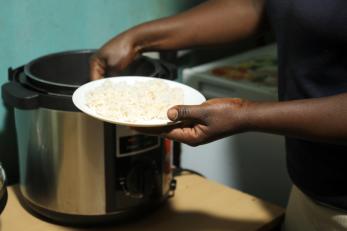Leading energy companies appointed to find clean, affordable cooking solutions for urban informal settlements in Freetown, Sierra Leone

Following a recent call for applications, the Enabling African Cities for Transformative Energy Access’ (ENACT) implementing partners ICLEI Africa and Energy 4 Impact, with support from the Freetown City Council, have awarded just over £100,000 in grants to three clean cooking companies to identify viable and scalable clean cooking solutions for households and microbusinesses in Susan’s Bay informal settlement in Freetown, Sierra Leone.
The funding for Afrigas, ILEM Africa and PayGas is a first step in supporting private sector companies to enter urban informal settlements where innovative cooking solutions could save the time-consuming labour of collecting firewood, improve health by curtailing indoor air pollution, lessen the risks of life-endangering fires, reduce greenhouse gas emissions, foster economic opportunities, and reduce fuel costs.
An LPG cylinder currently costs more than the annual rent of a slum dweller in Freetown, so we need more affordable clean cooking solutions.
Yvonne Aki-Sawyerr, Mayor, Freetown City Council
Technical advisory support from Energy 4 Impact will help the companies develop business cases that prove the financial and social viability of improving energy access in informal settlements through market-led approaches. Their work will feed into the Enabling African Cities for Transformative Energy Access (ENACT) project which aims to improve energy access for the urban poor through market-led interventions in informal settlements in Africa.
The three companies were chosen for their expertise around the provision of cleaner and more affordable energy in development settings:
Afrigas SL is a leading LPG filling and distribution company that has pioneered the mass introduction of cooking gas in Sierra Leone by making it accessible through its national network of distribution depots and local vendors. It now aims to develop a business and last mile delivery model to extend access to its LPG products in Susan’s Bay and other vulnerable communities within Freetown and Sierra Leone. The model will also include financing options to end-users to enhance the affordability of the LPG products.
ILEM Africa works closely with national institutions, development organisations and the private sector to implement energy and environment related development programmes. It will now seek to identify suitable clean cooking options that would allow end-users to transition up the cooking ladder from traditional, inefficient, and often dirty cooking technologies. It will also identify potential partners to help implement the identified clean cooking solutions.
PayGas is an essential service provider that uses a patented ‘PAY As You Gas’ platform alongside LPG micro-refilling stations to enable low-income customers to purchase as much LPG as they can afford, from as little as $1. Aiming to expand into the West African region, it will now investigate the viability of deploying this technology and business model in urban informal settlements.
Susan’s Bay is a large, overcrowded and very poor informal settlement in Freetown where many residents earn a marginal income through activities such as fishing or petty trading. Like most informal urban settlements, the lack of quality basic services such as energy access has stunted the economy, leading to missed livelihood opportunities and a diminished quality of life. Challenges such as end-user affordability and limited funding to introduce and test solutions often impede energy providers from serving these communities. Nevertheless, many people living and working in the community believe that improving conditions in Susan’s Bay is far preferable to tearing down the settlement: when the three companies were introduced at a community meeting, locals welcomed the trialling of new solutions.
ENACT’s intervention will open a market for energy-based companies to deliver reliable and affordable products and services to poor urban communities and so lead to better health and socio-economic outcomes.